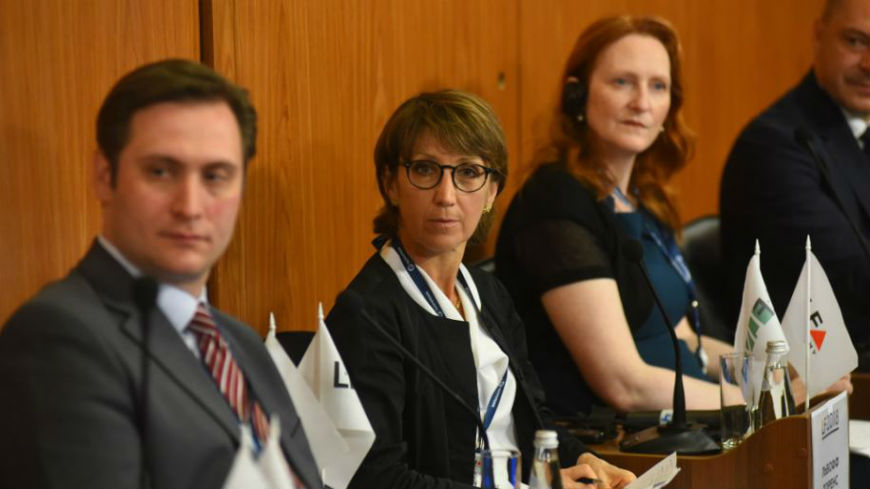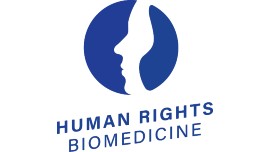The legal control of cutting-edge biomedical technologies was discussed at the VIII St. Petersburg Legal Forum.
The discussion was moderated by Secretary of the Committee on Bioethics of the Council of Europe Laurence Lwoff. The session was attended by former Director General of the Directorate General Human Rights and Rule of Law of the Council of Europe Philippe Boillat, Judge of the European Court of Human Rights Dmitry Dedov, Member of the Committee on Bioethics of the Council of Europe Siobhan O’Sullivan, Deputy Minister of Health of the Russian Federation Oleg Salagay, Head of the Critical Heart Failure Center of the National Medical Research Center of Transplantology and Artificial Organs Aleksey Shevchenko.
In her opening remarks, Laurence Lwoff pointed out that new technologies eroded the boundaries between medicine and other domains of human activity. ‘New technologies bring progress, but they may turn out to be invasive and interfere in people’s lives, moreover they also carry the risk of being abused by people’, said Ms. Lwoff. Synergy between the progress and the protection of human rights has become the core of the session.
In her turn, Siobhan O’Sullivan paid attention to the three main directions of modern technologies that are closely connected with the protection of human rights: genomics, neurobiology and artificial intelligence. Nowadays, everybody can have their genome examined to find out disease-disposing genes. With that, the use of this information may involve certain risks. ‘Taking genome information from different sources is possible, however it is not technically easy to define the personality of an individual. This makes you vulnerable to potential discrimination. For example, you may be turned down by a potential employer who is wary of additional costs due to your health problems’, assumed the Member of the Committee on Bioethics.
Ms. O’Sullivan also commented on the rapid progress in the artificial intelligence area. ‘Google has already developed the algorithm to help with cancer diagnosis which is 16% more effective than doctors. The artificial intelligence can be ahead of people, however it is not the case for all the domains. And one cannot fix the date when it completely wins human beings’, emphasized Siobhan O’Sullivan.
Alexey Shevchenko talked about the influence of modern technologies on medical routine: ‘Today, there are technologies that can bring fatally ill patients back to life, to work, to society’. He also emphasized that medical experts desperately need transparent laws that would facilitate their work and would ensure full access of patients to the right of health care. He referred to the Russian Law on Transplantology as to a successful example of legal practice.
Judge Dmitry Dedov pointed out that new technologies are also coming into ECHR practices. ‘Every time we work on legal issues we have to face ethical challenges as well. Surprisingly, they are so closely intertwined’ said Mr. Dedov. To illustrate the above mentioned he referred to some real cases of surrogate mothers, auxiliary methods of human reproduction, euthanasia and life-sustaining treatment.
According to Deputy Minister of Health of the Russian Federation Oleg Salagay in Russia this domain is regulated by the whole set of documents, including the most important one # 323-ФЗ On Fundamental Healthcare Principles in the Russian Federation. Mr. Salagay also pointed out the two main challenges to deal with in the nearest future: to define the domains that require additional regulation and the challenge of the implementation. Among the domains that need additional regulation the Deputy Minister distinguished genomics, genome editing and the perfection of human nature with the help of progress. Oleg Salagay urged to remember about the modern risks to human life and health.
Philippe Boillat emphasized the importance of intergovernmental organizations and namely the Council of Europe in international dialogue aimed to bridge the gap between new technologies and the protection of human rights. ‘Progress is measured internationally. All countries have to face the same challenges, pointed out Mr. Boillat, this is not the domain just for a limited number of experts. We should be inclusive and draw in all parties concerned, including legal and medical experts, academicians, competent government authorities and of course representatives of civil society and the general public’.
To summarise, moderator Laurence Lwoff thanked all the participant and experts and expressed the hope that the discussion had made its contribution to the global dialogue.











